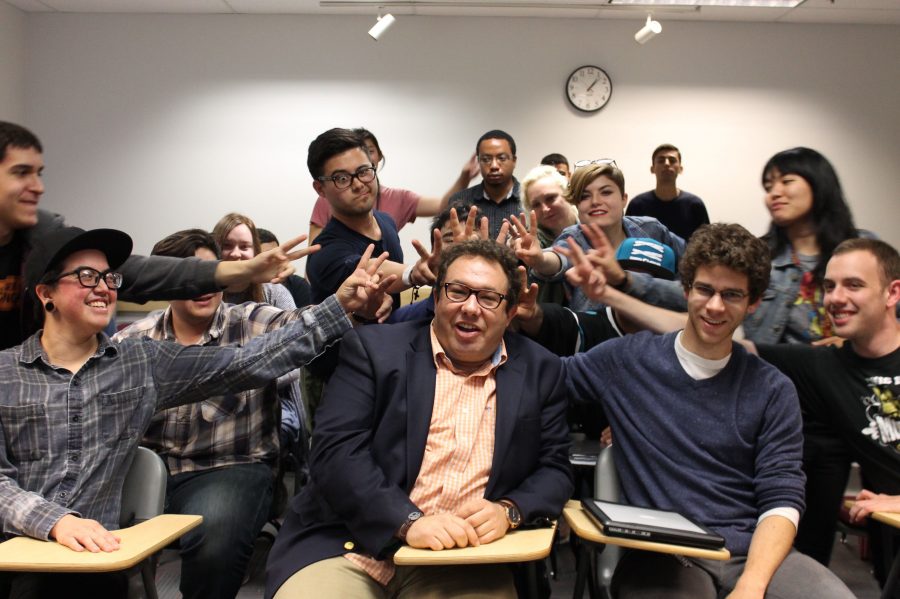‘Obscene’ screenwriting
With a “filthy, vulgar, conversational” teaching style, screenwriting instructor mentors his students through the struggle of the creative process and the hardships of life.
May 18, 2016
Stray papers and erratic objects form a ring around De Anza College screenwriting professor Barak Goldman in his office. He leans back comfortably in his chair, projecting an atmosphere of casual confidence.
“My office is who I am,” Goldman said. “I don’t have the time to organize (the papers), nor do I have the desire to organize them.”
Goldman calls his teaching style “obscene, filthy, vulgar, conversational, interactive, loud and obnoxious.”
“I want to teach as if a crappy, easily bored student such as myself would want to be taught,” Goldman said.
Goldman is popular during his office hours, with students asking for help on assignments, or a teacher’s assistant dropping off someone’s forgotten screenplay. His goal is to be able to reach students through their writing on an artistic level.
“For me, to be able to help people write what they know and who they know, I have to get to know them,” Goldman said.
Alejandra Araujo, 22, screenwriting major, said she was scared to talk about her stories and herself when she began Goldman’s class. She is now a T.A. for him.
“Barak is really good at helping people open up, both about their stories and themselves,” she said.
Araujo said she cried in his office many times talking about what she wants in life, and Goldman always was supportive and helpful. She said she sees Goldman as a mentor and a friend.
Goldman has extensive experience in the industry. He writes comedy, he said, because even when he writes dramas, he can’t help but put jokes in. After graduating from UCLA, he moved to Los Angeles and spent four years writing in Hollywood. He wrote and produced television shows for Columbia-Tristar, Dish Network, The History Channel and USA Network, in addition to ghost writing for A-list talent and having his own TV and film projects in studio development.
Goldman is currently working on a spec-pilot episode for a TV show. He said he hopes the script will take off. He is also working on short projects with a former classmate from his UCLA screenwriting class and plans to begin filming in summer.
The business of screenwriting is based on rejection, Goldman said, and to succeed, you need to understand how to learn from failure.
“Anytime you do an art, anytime you do anything, you have to put it out in the industry for people to read,” said Goldman. “It’s an incredible, subjective thing.”
Goldman said he wants his students to love what they do and enjoy the struggle, as there are very few things more difficult than writing a good screenplay.
“I want people to have the strength and the courage to put their work out under scrutiny,” Goldman said.
Jake Roggenbusch, 21, screenwriting major, said that Goldman helps students handle the intensity of writing. Roggenbusch has been taking Goldman’s classes since 2013 and is now a T.A.
“It’s a very deeply personal thing what people write down,” Roggenbusch said about screenwriting for Goldman. “There’s always opportunity to go into deeper, darker territory, and he always encourages that.”

